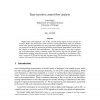Free Online Productivity Tools
i2Speak
i2Symbol
i2OCR
iTex2Img
iWeb2Print
iWeb2Shot
i2Type
iPdf2Split
iPdf2Merge
i2Bopomofo
i2Arabic
i2Style
i2Image
i2PDF
iLatex2Rtf
Sci2ools
111
click to vote
ML
2006
ACM
2006
ACM
Type-sensitive control-flow analysis
Higher-order typed languages, such as ML, provide strong support for data and type abn. While such abstraction is often viewed as costing performance, there are situations where it may provide opportunities for more aggressive program optimization. Specifically, we oit the fact that type abstraction guarantees representation independence, which allows the compiler to specialize data representations. This paper describes a first step in supporting such optimizations; namely a modular control-flow analysis that uses the program's type information to compute more precise results. We present our algorithm as an extension of Serrano's version of 0-CFA and we show that it respects types. We also discuss applications of the analysis with a specific focus on optimizing Concurrent ML programs.
Aggressive Program Optimization | Machine Learning | ML 2006 | Modular Control-flow Analysis | Type Abn |
Related Content
| Added | 14 Dec 2010 |
| Updated | 14 Dec 2010 |
| Type | Journal |
| Year | 2006 |
| Where | ML |
| Authors | John H. Reppy |
Comments (0)

